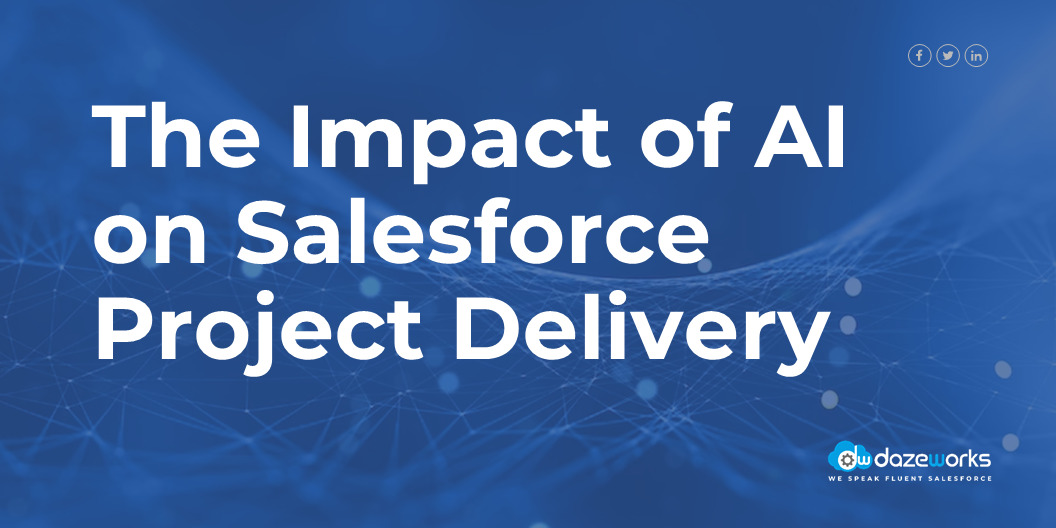
Impact of AI on Salesforce Project Delivery
minutes read
Artificial intelligence has always been a crucial aspect of the Salesforce organization. AI’s integration into Salesforce offers a range of benefits throughout the project lifecycle, from planning to execution and ongoing optimization. In this blog, we will delve into the potential that AI holds in ensuring successful Salesforce project delivery.

Key Applications of AI in Salesforce Project Delivery
- Predictive Analytics: AI enables organizations to leverage historical data and patterns to make accurate predictions about future project outcomes. By analyzing past projects’ data, AI algorithms can identify potential risks, estimate resource requirements, and predict project timelines. This allows project managers to proactively address issues before they arise and optimize resource allocation.
- Intelligent Automation: AI-powered automation tools can significantly reduce manual efforts involved in repetitive tasks such as data entry, document generation, and report creation. This enables project teams to focus on value-added activities while ensuring accuracy and efficiency throughout the project lifecycle.
- Natural Language Processing (NLP): NLP technologies enable seamless communication between users and Salesforce systems by understanding human language commands or queries. This empowers users to interact with the system using voice commands or written text, enhancing user experience and productivity.
- Sentiment Analysis: By analyzing customer feedback from various channels such as social media platforms or surveys, AI can determine customer sentiment toward specific projects or features within Salesforce.
How AI Helps Salesforce Project Delivery?
Enhanced Data Insights and Decision-Making
AI-powered analytics within Salesforce provide deeper insights into customer behavior, preferences, and market trends. This enables project managers to make data-driven decisions, identify opportunities, and anticipate customer needs. Through predictive analytics, AI can forecast sales trends, helping teams strategize and allocate resources more effectively.
Smarter Resource Allocation and Planning
AI algorithms analyze historical project data, team performance, and resource utilization to optimize project planning. By identifying patterns and predicting resource needs, AI assists in allocating the right talent and resources at the right time, preventing bottlenecks and delays.
Automated Workflows and Process Optimization
AI-driven automation streamlines repetitive tasks and workflows, reducing manual intervention and human error. Integration with Salesforce enables the automation of routine processes like data entry, lead nurturing, and customer interactions, freeing up valuable time for project teams to focus on higher-value tasks.
Personalized Customer Experiences
AI’s ability to process vast amounts of customer data allows for personalized interactions and tailored experiences. Salesforce AI tools help in creating customer journey maps, recommending personalized products or services, and optimizing communication channels, fostering stronger customer relationships and loyalty.
Predictive Maintenance and Issue Resolution
Within Salesforce, AI-powered predictive maintenance capabilities can anticipate potential issues in the system. By identifying patterns that indicate system failures or performance degradation, teams can proactively address these concerns before they escalate, ensuring smoother project delivery and system reliability.
Continuous Learning and Improvement
AI-powered analytics continuously learn from data inputs, refining predictions and recommendations over time. Through machine learning models, Salesforce becomes more adept at understanding user behaviors, refining strategies, and adapting to changing market dynamics, leading to ongoing project improvement.
Overcoming Challenges and Maximizing AI’s Potential
While AI offers incredible advantages, integrating it into Salesforce project delivery isn’t without challenges. Privacy concerns, data quality issues, and the need for specialized skills to leverage AI tools effectively can be hurdles. However, organizations can overcome these challenges by ensuring data privacy compliance, investing in data quality management, providing adequate training, and maximizing AI’s potential within Salesforce. The synergy between AI and Salesforce is poised to grow even more impactful. Natural language processing (NLP) advancements may facilitate AI-driven conversational interfaces for better customer engagement. Moreover, AI-powered predictive models will become more sophisticated, enabling hyper-personalized marketing strategies and predictive analytics for more accurate forecasting.
